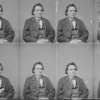Over half a century ago, when I was – very reluctantly – thrust into the army’s infantry basic training, my training platoon was a very mixed collection of young men. There were some (like the author) who had joined army reserve or national guard units for the lesser evil of six months of active duty, followed by weekend drills and two or three weeks of summer training exercises, rather than years of active duty and possible Vietnam time. Then there were a few men actually gung-ho about joining the military. There were also a few unlucky individuals who had been drafted into the active duty army. And there were even some trainees who – faced with a harsh choice between enlisting in the army or going to jail at the insistence of a judge – went with the camouflage green rather than prison overalls.
But there were also a few who had signed up precisely because they had come to recognise the trajectories of their lives were leading them to blasted futures and missed opportunities for any kind of decent future. Those young men realised that for them, joining the military was the only pathway to better life possibilities, real training and skills, opportunities for a university education and some new-found self-respect. And right there may be where the crucial turning point in JD Vance’s life is to be located, the man now named the vice-presidential nominee of the Republican Party.
Given the age of the headliner of the Republican Party’s ticket – Donald Trump – there is a real possibility the 39-year-old Vance could become president in the event of disability or even death of a President Trump. Or, at the minimum, assuming Donald Trump returns as president, Vance would almost instantly become the automatic front-runner for the 2028 presidential nomination of his party. And that would be true even if a President Trump remained healthy over the next four years, because Trump is constitutionally ineligible for a third term as president.
By now, most people think they know something about who Donald Trump is and what kind of man he would be as president again – based on his public presence and previous, chaotic track record as president. But what about his running mate, the man who would be vice-president and his life story and values?
Although he had moved to southern Ohio as a child from Kentucky, Vance’s deeper origins with which he maintained continuing connections are to be found in the often-overlooked mountains, hills and hollows of Appalachia. That region extends over sections of many southern and eastern states. Economically, it remains significantly poorer compared with national averages or even the other parts of the same states but beyond Appalachia.
For many years, the region had often been despoiled by the exploitation of underground coal and aboveground timber resources by distant corporations. In prior years, the nation’s dependence on coal for heating, power generation, and fuel for trains and ships had made the United Mine Workers – the union that had organised many of the mines in bruising conflicts with owners – a political force to be reckoned with and a mainstay of the Democratic Party. But those years are now long gone.
Many of Appalachia’s inhabitants are descendants of poor Scots-Irish settlers who had migrated there from the mid-18th century onwards as colonial settlers searching for “virgin” farmland. Frequently denigrated as “hillbillies” (a term Vance embraced in his noteworthy memoir), those Appalachian-dwelling descendants of Scots-Irish (people who had first moved from poverty-stricken Scotland to Ireland and then to America) have long been the backbone of American military enlistments. Many also became part of a vast migration to the industrial cities of the midwest that paralleled the “great migration” of African Americans from the south to the big cities of the northeast and midwest. Such migrants were major sources of workers for factories and workshops.
More recently, among those who have remained in Appalachia and among the many who moved from there, the social pathologies of broken homes, alcoholism and drug addiction – including the newest, most potent curse of fentanyl – have savaged many in those communities. Vance’s family’s difficult saga also mirrors such experiences, including his escape to the military.
Once Vance had concluded his enlistment in the Marines, which had included duty as a military combat correspondent in Iraq, he could draw upon the benefits of educational funding for veterans to go to Ohio State University for a BA and then Yale Law School. There he met another student, Usha, whom he married. Subsequent to her law school training, she has had a successful career as an attorney, including service as a clerk for Supreme Court justices — something that is a prestigious start in a young lawyer’s career.
A few years after graduation, Vance joined a West Coast venture capital firm (reportedly to relatively indifferent success) backed by Peter Thiel, the prominent rightwing, conservative entrepreneur in Silicon Valley. Earlier, Thiel had given a lecture to Yale law students while Vance was there and Thiel’s advocacy of the pursuit of social good over sheer cut-throat competition seems to have had real resonance with the young Vance. That had led him to seek out working for Thiel.
Vance memorably described his trajectory from Appalachia to southern Ohio to the Marines and thence to Yale Law School in his gripping 2016 memoir, Hillbilly Elegy – a best seller that was eventually turned into a successful film as well. Book reviews in major media were very positive, treating Vance’s book as an important first-hand witness from the often overlooked part of the American landscape.
The New York Times reviewer Jennifer Señor noted back in 2016: “After reading Hillbilly Elegy, you can easily understand why. This is a historically peculiar election cycle, boisterously disrupted by outsiders, one of whom [Donald Trump] found the perfect host body in the Republican Party and became its presidential nominee. An investigation of voter estrangement has never felt more urgent, and we’re certainly not getting one from the lacquered chatterers on the boob tube.
“Now, along comes Mr Vance, offering a compassionate, discerning sociological analysis of the white underclass that has helped drive the politics of rebellion, particularly the ascent of Donald J Trump. Combining thoughtful inquiry with firsthand experience, Mr. Vance has inadvertently provided a civilised reference guide for an uncivilised election, and he’s done so in a vocabulary intelligible to both Democrats and Republicans.”
Similarly, the Washington Post’s reviewer, Amanda Erickson, said: “In recent months, JD Vance has become a spokesman for the cellphone working class, explaining why many of his ‘hillbilly’ friends will vote for Trump, but why he won’t. ‘These people — my people — are really struggling’, he said in a recent American Conservative interview. ‘And there hasn’t been a single political candidate who speaks to those struggles in a long time. Donald Trump at least tries’.
“In his book Hillbilly Elegy, the politically conservative Vance focuses more on the personal than the polemic. Still, he wants people to understand something he learnt ‘only recently – that for those of us lucky enough to live the American Dream, the demons of a life we left behind continue to chase us’. For those who never achieved it at all, the demons – the anger, the depression and more – are hard to shake off. Trump, Vance said in the interview, taps into that. ‘His apocalyptic tone,’ he said, ‘matches their lived experiences on the ground’.”
Vance himself has explained his growing up by saying: “From low social mobility to poverty to divorce and drug addiction, my home is a hub of misery.” And in contrast to other groups that also experience widespread poverty, “working class whites are the most pessimistic group in America”. And, by Vance’s lights, the most overlooked.
Rising up from the depths of poverty

Republican vice-presidential candidate, JD Vance, attends the first day of the Republican National Convention in Milwaukee, Wisconsin, on 15 July 2024. (Photo: Win McNamee / Getty Images)

From left: Republican presidential nominee Donald Trump and his wife, Melania, with his vice presidential running mate, JD Vance, and his wife, Usha, on the final day of the Republican National Convention in Milwaukee, Wisconsin, on 18 July 2024. (Photo: Justin Lane / EPA-EFE)
Vance’s book and his journey obviously echo many other tales of people rising up from the depths of poverty and despair, based on their own efforts and a fear of falling back to where they had come from, similarly to novelist Theodore Dreiser’s masterful Sister Carrie. Or, in cinematic terms, it is eerily similar to Richard Gere’s character, Mayo, in the film, An Officer and a Gentleman. At the hinge moment of the film, Mayo, a layabout son of a navy enlisted man, reaches that choice when he is pushed by his drill instructor beyond what Mayo believes are his limits. At that point Mayo decides not to quit the training after all no matter how tough it is, screaming in panic and fear: “I got no place else to go!” So, too, Vance, perhaps, when he joined the Marines.
The book and its widespread readership then helped to propel Vance into a successful race for the Senate in the state of Ohio only in 2022. As a result, it is amazing that he has now risen to the nomination for vice-president after less than two years in public office and only 11 years in total after law school.
That is an extraordinary trajectory rivalling the near-meteoric rise of someone like Barack Obama in his ascent to the top of the heap a decade and a half earlier. In Vance’s case, this may well be just the beginning. Four years from now he will still only be in his early 40s and the almost inevitable heir to the Maga cult – now that he has recanted his previous judgement of Donald Trump and embraced a series of policies that would seem to be antithetical to the very policies that saved him. And that doesn’t even include his foreign policy views, which have taken a starkly isolationist tone, especially with regard to American alliances abroad and support for Ukraine.
Describing his own intellectual journey and how he veered towards the conservative direction, he said: “The left’s intellectuals focused much more on the structural and external problems facing families like mine – the difficulty in finding jobs and the lack of funding for certain types of resources. And while I agreed that more resources were often necessary, there seemed to me a sense in which our most destructive behaviours persisted – even flourished – in times of material comfort. The economic left was often more compassionate, but theirs was a kind of compassion – devoid of any expectation– that reeked of giving up. A compassion that assumes a person is disadvantaged to the point of hopelessness is like sympathy for a zoo animal, and I had no use for it.”
Meanwhile, the Guardian’s Hari Kunzru, in his review, was somewhat more cautious about the omniscience of Vance’s vision, noting: “Some books stand alone, while others are almost impossible to assess outside the political and cultural debates of their time. In June 2016, a few months before the US election, a young Silicon Valley investment manager published a workmanlike memoir, which has become a No 1 New York Times bestseller. JD Vance had grown up poor in rust-belt Ohio, in a family that was, by his account, highly dysfunctional. His book describes how he transcended severe disadvantages to attend Yale law school and go on to a lucrative career. It follows the broad arc of the survivor story, a genre that has a special place in the US’s conversation with itself. Class mobility in America is stagnant and Vance is a statistical outlier. He should not have made it out of Middletown, Ohio. That he did, he ascribes to luck, character and the relative stability provided by his grandmother, known as ‘Mamaw’.
“ ‘Mamaw’ and ‘Papaw’ were descended from whites who settled the hill country of eastern Kentucky in the 18th and 19th centuries. During the depression, Appalachian migrants streamed out of the mountains into the factories of the north. The Vances were part of a second postwar wave that brought them to Middletown, a place that had grown up around a giant steel mill. Papaw (despite being a violent alcoholic) had had a good life as a worker for the American Rolling Mill Company, but the business – and the town that depended on it – plummeted as heavy industry moved to east Asia. By the time Vance was growing up, the days of company social outings and gold-plated pensions were long gone.
Moreover, as Kunzru goes on to note: “Vance makes excursions into more academic, less personal kinds of writing, combining his story with a sketchy ethnography of the ‘surprisingly cohesive culture’ of his ‘hillbilly’ people. He designates himself as ‘Scots-Irish’, taking care to distinguish the people of ‘Greater Appalachia’ from ‘the Wasps of the northeast’. This is a hugely loaded distinction, a claim of outlaw whiteness that has been politically mobilised in the victory of Donald Trump’s revanchist identity politics. Vance’s wife’s background is not described in the book, but she has the Hindu name Usha, which suggests an unacknowledged layer of complexity to this identification.”
Given all the vicissitudes of Vance’s early life, but due to his family’s edgy survival because of the interventions of social welfare networks, and at least originally, good union wages and benefits, and then his own success funded through federal benefits for higher education, it seems surprising Vance then made a sharp turn to the right to embrace a kind of social Darwinism that effectively argues that life success, even survival, is dependent on individuals’ personal initiative, willpower and perseverance, rather than help from a community, let alone the larger layer of assistance by the government. Perhaps this came about as a combination of his undeniable success in academia despite his background, the grit of the overwhelming discipline of life in the Marines being brought to bear and then, finally, the influence of his Silicon Valley patron. Maybe there was even a soupçon of inspiration from the drive of his spouse – a child of south Asian immigrants — as well.
When JD Vance accepted the GOP’s nomination as vice-president the other day, he drew upon the arc of his life to demonstrate anew the presumed grievances of “his people” in language that would not have been out of place coming from Senator Bernie Sanders or Representative Alexandria Ocasio-Cortez. Vance condemned past US leaders who “have failed and failed again. As always, America’s ruling class wrote the checks, communities like mine paid the price. For decades that divide between the few with their power and comfort in Washington and the rest of us only widened. From Iraq to Afghanistan, from the financial crisis to the Great Recession, from open borders to stagnating wages, the people who govern this country have failed and failed again.” Calculation or deep belief?
And in offering his obeisance to Donald Trump, in total contrast to his views about Trump he had shared just a few years earlier, Vance said in his acceptance speech: “The only thing that we need to do right now, the most important thing that we can do for those people, for that American nation that we all love, is to re-elect Donald J Trump president of the United States. Mr President, I will never take for granted the trust you have put in me and what an honour it is to help achieve the extraordinary vision that you have for this country. Now, I pledge to every American, no matter your party, I will give you everything I have to serve you and to make this country a place where every dream you have for yourself, your family and your country will be possible once again.”
Then, in what might seem to have been a discordant note, given how so many at the convention were wearing bandages on their ears in honour of Trump’s near-death in a failed assassination attempt, Vance described how his grandmother had guns throughout her home, saying: “The thing is that they were stashed all over her house, under her bed, in her closet, in the silverware drawer and we wondered what was going on. And it occurred to us that towards the end of her life, Mamaw couldn’t get around so well, and so this frail old woman made sure that no matter where she was, she was within arm’s length of whatever she needed to protect her family. That’s who we fight for. That’s the American spirit.” Whoa.
Going forward, it is going to be fascinating to watch how Trump and Vance interact on the campaign trail and, then – if they win – once they are in office. But it will be even more astonishing to watch how this inexperienced, but whip-sharp politician fights off the old guard of old-style Republican conservatism, as well as competitors for leadership of Donald Trump’s Maga cultists. DM


